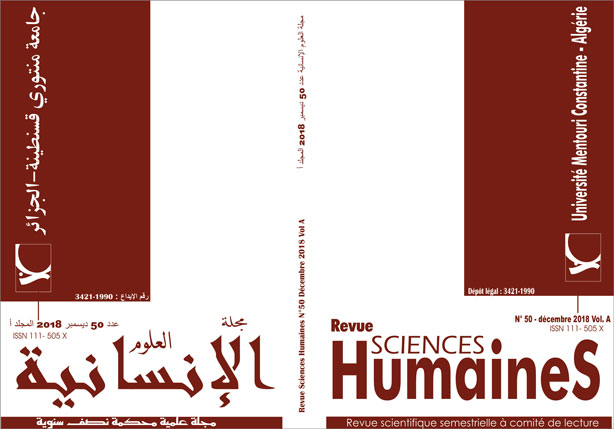A Study of Verbal Reasoning and ESL Vocabulary Learning from a Psycholinguistic Perspective
Keywords:
lexical inference, ESL vocabulary acquisition, mental lexiconAbstract
The present study is mainly interested in finding out the impact of verbal reasoning abilities; more precisely that of lexical inference,in improving ESLvocabulary learning. A group of twenty (20)female learners (aged between 19 and 21 years old), of about 220 third year learners/ LMD systemat the English department/ the University of Frère Mentouri/ Constantine1, were used in the study. The participantswere tested forthe dependent variable that was rated from Cloze Procedure Format activitiesthat were administered during the year 2014-2015, by the end ofsomelectures on Psychopedagogy. Every class, the learners were assigned a text in the latter fieldand had to fill in the blanks using provided technical termslearnt in the same lecture. The collected data was analyzed, after that,and results show that lexical inference, as a cognitive skill, corresponds to ESL technicalvocabulary learning
Downloads
References
(1)-Akpinar, K. D. (2013). Lexical inferencing: perceptions and actual behaviours ofTurkish English as a foreign language learners’ handling of unknown vocabulary. SouthAfrican Journal of Education, 33 (3). 1-4.
(2)-Ausubel, D.P. (1967). Learning theory and classroom practice.Toronto: Ontario Institute for Studies in Education.
(3)-Baddeley, A. D. (1997). Human memory: theory and practice. Hove: Psychology Press.
(4)-Baker, M. (1988). Sub-technical vocabulary and the ESP teacher: an analysis of some rhetorical items in medical journal articles. Reading in a Foreign Language, 4 (2), 91-105.
(5)-Bogaards, P., & Laufer, B. ( Eds.) (2004). Vocabulary in a Second Language. Selection, acquisition, and testing. Amsterdam: John Benjamins Publishing Company.
(6)-Burton, N.W., Welsh,C., Kostin, I., & VanEssen, T. (2009). Toward a Definition of Verbal Reasoning in Higher Education. Research Report [PDF file].Educational TestingService.Retrieved 26 October 2016, from http://www.files.eric.ed.gov/fulltext/ED507807.
(7)-Carton A. S. (1971). Inferencing: a process in using and learning language. In P. Pimsleur & T. Quinn (Eds.), The Psychology of Second Language Learning. Cambridge: Cambridge University Press.
(8)-Chapman, A. (Ed.). (1993). Making Sense: Teaching Critical Reading Across the Curriculum. New York: The College Board.
(9)-Chavosh, M., & Davoud, M. (2016). The effect of explicit teaching of lexical inferencing strategies on vocabulary learning among Iranian field-dependent an independent EFLlearners. Studies in Literature and Language, 12 (4), 44-53.
(10)-Comer, W.J. (2012). Lexical Inferencing in Reading L2 Russian [PDF file]. Reading in a Foreign Language, 24 (2), 209-30.
(11)-Donges, C. (2016). What is Verbal Reasoning and How Does it Affect Learning. Retrieved 27October2016, from http//: www.Classroom.synonym.com.
(12)-Fan, M. (2003). Frequency of use, perceived usefulness, and actual usefulness of second language vocabulary strategies: A study of Hong Kong learners. The Modern Language Journal, 87(2), 222-41.
(13)-Grasser, A.L., Millis, K.K., & Zwaan, R.A. (1997). Discourse comprehension. Annual Review of Psychology, 48 (1), 163-89.
(14)-Haastrup, K. (1991). Lexical Inferencing Procedures or Talking About Words: Receptive Procedures in Foreign Language Learning With Special Reference to English. Tubingen, Germany: Gunter Narr.
(15)-Henriksen, B. (2008). Declarative lexical knowledge. In D. Albrechtsen, K. Haastrup, & B. Henriksen (Eds.), Vocabulary and Writing in a First and Second Language: Processes and Development. Basingstoke: Palgrave Macmillan.
(16)-Hulstijn, J. H. (2000). Mnemonic methods in foreign language vocabulary learning: theoretical considerations and pedagogical implications. In J. Coady & T. Huckin (Eds.), Second Language Vocabulary Acquisition(pp. 203-24). Cambridge: Cambridge University Press.
(17)-Introduction to the Verbal Measure [PDF file] (2009). Retrieved 27October, 2016, from http://www.ets.org/.../GRE.Intro_Verbal_18.point.p.
(18)-Lewis, M. (1993). The Lexical Approach. Hove, England: Language Teaching Publications.
(19)-Lohman, P.F. (2000). Complex information processing and intelligence. In R.S. Sternberg (Ed.), Handbook of Intelligence. Cambridge: Cambridge University Press.
(20)-McCarthy, M., Okeeffe, A., & Walsh, S. (2010). Vocabulary Matrix. Understanding, Learning, Teaching. Hampshire (UK): HEINLE, CENGAGE Learning.
(21)-Milton, J. (2009). Measuring Second Language Vocabulary Acquisition. Bristol, UK: Multilingual Matters.
(22)-Mudraya, O. (2006). Engineering English: a lexical frequency instructional model. English for Specific Purposes, 25 (2), 238–39.
(23)-Nation, I. S. P. (2001). Learning Vocabulary in Another Language. Cambridge: Cambridge University Press.
(24)-Nation, P., & Gu, P. (2007). Focus on Vocabulary. Sydney: NCELTR.
(25)-Nippold, M. (2004). Research on later language development: international perspectives. In R. A. Berman (Ed.), Language development across childhood and adolescence (pp. 1-8). Amsterdam: John Benjamins.
(26)-Paquot, M. (2010). Academic Vocabulary in Learner Writing. London: Continuum International Publishing Group.
(27)-Prior, A., Goldina, A., Shany, M., Geva, E., & Katzir, T. (2014). Lexical Inferencing in L2: Predictive Roles of Vocabulary Knowledge and Reading Skill Beyond Reading Comprehension [PDF file]. Retrieved 3August2016, from http:// www. Research gate.net/
(28)-Read, J. (2000). Assessing Vocabulary. Cambridge: Cambridge University Press.Reading Framework for the 2003 National Assessment of Educational Progress (2002). Washington: NA Governing Board. (US Department of Education).
(29)-Reisberg, D. (2001). Associative theories of long term memory. Cognition. Exploring the Science of the Mind. 2nd ed. New York: W.W. Norton & Company.
(30)-Schmitt, N. (2000). Vocabulary in Language Teaching. Richards, J. C. (Ed.). Cambridge: Cambridge University Press.
(31)-Schmitt, N. (2010). Researching Vocabulary. A Vocabulary Research Manual. London:Palgrave macmillan.
(32)-Strazny, P. (Ed.). (2005). Encyclopedia of Linguistics. V 1&2. New York: FITZROY DEARBORN.
(33)-Swan, M. (1997). The influence of the mother tongue on second language vocabulary acquisition and use. In N. Schmitt & M. McCarthy (Eds.), Vocabulary: Description, Acquisition and Pedagogy(pp. 156-80). Cambridge: Cambridge University Press.
(34)-Takac,V. P. (2008). Vocabulay Learning Strategies and Foreign Language Acquisition.Toronto (Canada): MULTILINGUAL MATTERS LTD.
(35)-Wesche, M. B., & Paribakht, T. S. (2010). Lexical Inferencing in a First and Second Language. Cross Linguistic Dimensions. Bristol: MULTILINGUAL MATTERS.
(36)-Yang S. L. (2014). How Advanced EFL Taiwanese Learners Infer Meanings of Unknown Words While Reading[PDF file]. Retrieved 20 August 2016, from http//: www. 140.127.82.166/retrieve/23100/019.
















